 Liane Zane’s Elioud Legacy trilogy, all three books of which I’ve previously reviewed, is supernatural fiction, written by a Roman Catholic author, and premised on the fictional conceit that matings between angelic beings (both fallen and unfallen) and humans have been going on since before the Flood, producing mixed-race offspring who are physically human but have certain heightened physical or even latent supernatural abilities. That trilogy focused on three strong and courageous young women, who when it opened were completely unaware of their angelic genes, and all of whom were both serving in the intelligence services of their various countries, and collaborating with each other on the side in a covert alliance to provide some special protection for the victims of sexual assault and trafficking. The Covert Guardian is the first volume of a projected prequel trilogy, set a few years before the opening of the previously-published one, which will tell the “origin story” of their friendship and alliance. Here, our protagonist is Olivia Markham, the trio’s unofficial ringleader, and we learn how, as a 20-year-old college pre-med student, she unexpectedly came to join the CIA.
Liane Zane’s Elioud Legacy trilogy, all three books of which I’ve previously reviewed, is supernatural fiction, written by a Roman Catholic author, and premised on the fictional conceit that matings between angelic beings (both fallen and unfallen) and humans have been going on since before the Flood, producing mixed-race offspring who are physically human but have certain heightened physical or even latent supernatural abilities. That trilogy focused on three strong and courageous young women, who when it opened were completely unaware of their angelic genes, and all of whom were both serving in the intelligence services of their various countries, and collaborating with each other on the side in a covert alliance to provide some special protection for the victims of sexual assault and trafficking. The Covert Guardian is the first volume of a projected prequel trilogy, set a few years before the opening of the previously-published one, which will tell the “origin story” of their friendship and alliance. Here, our protagonist is Olivia Markham, the trio’s unofficial ringleader, and we learn how, as a 20-year-old college pre-med student, she unexpectedly came to join the CIA.
Unlike the first trilogy, this one really has no supernatural elements. Readers who’ve read the former will suspect, from certain subtle clues, that a couple of secondary characters here may also be Elioud, and will remember the St. Michael medal (a gift from her sensei) that Olivia wears, which feels strangely warm at times; and she has a sort of instinctive sixth sense for approaching danger that her then-boyfriend rather snidely dismisses as her “spidey sense.” But none of this is obviously paranormal nor impossible to explain naturalistically. I’ve classified the book as straight-out, descriptive action-adventure and espionage fiction, and it will definitely appeal to fans of those genres whether they have any liking for supernatural fiction or not.
The previously-published books mentioned, as a painful experience in Olivia’s past, the murder of her cousin Emily when the two girls were 16; they were close, and the tragedy was a formative factor in shaping Olivia’s deep desire to protect the innocent victims of brutality. In the modern U.S., the wheels of the justice system grind very slowly, so the killer’s trial was delayed until the summer before Olivia was to become a junior at Brown Univ. (She’s New England born and bred, living with her family in a suburban town outside Boston.) When our tale opens, soon after testifying, Olivia’s been talked by her boyfriend into joining him in a vacation on Ibiza, a real-life Mediterranean island off the coast of Spain which is a popular tourist destination, as a supposed opportunity to rest and heal from the re-lived traumatic experience. Even at this stage in her life, she’s strong, physically fit and athletic, smart, brave and quick-thinking; and since Emily’s murder, she’s been taking serious martial arts training. (And then there’s that “spidey sense” I mentioned….)
These qualities will stand her in good stead when, just four pages into the narrative, a squad of Islamist terrorists hit the beach, bent on slaughtering the revelers. Fortunately, a CIA counter-terrorist strike force is nearby; but by the time the action is over, Olivia’s displayed enough mettle to get their attention. (As they’ll soon learn, it also doesn’t hurt that she’s fluent in several languages, and qualified for the U.S. Olympic team in archery while still in high school.) Before the summer is over, she’s training at a CIA-run camp in North Carolina, and she feels that she’s found her true calling. And as luck would have it, an attractive female college student might just fit the mission profile for getting close to a wealthy young playboy type suspected of funding global terrorist activities. But chicanery, corruption, and betrayal of the U.S. aren’t necessarily things that only go on outside of the CIA, and our heroine’s path to joining the Company may not be an easy cake-walk.
Although the books of the Elioud Legacy trilogy are all thick, at just 155 pages, this one is more novella length, and a quick read. Like the former books, though, it moves around geographically, in this case to locations on three different continents; and the author’s knowledge of the physical geography of all of these settings is impressive. She’s a skilled wordsmith, seasoned in the novelist’s craft and able to immerse the reader in the story, and there are some surprises up her sleeve. For readers who want danger, tension, and well-depicted action scenes, this yarn definitely delivers. It’s not characterized by profound ethical dilemmas or deep spiritual, philosophical or political content, being more straightforward in those areas (in the context of the espionage genre, Zane is more in the tradition of Manning Coles or Alistair MacLean than, say, John LeCarre’), but I don’t view this as is any sense a fault, nor will most genre fans. What readers –genre fans or not– do want in fiction, more than action and danger, is the human element, a central character(s) we can like and feel invested in enough to care about the action and danger in the first place. That test is amply met here. Olivia is a winsome, dynamic protagonist whom we get to know and appreciate, and this is a character-driven tale of her growth and maturation in various ways in the crucible of a testing ordeal.
As I’ve said before in reviewing this author’s work, it’s fiction written by a Christian, rather than the kind of commercially “Christian fiction” the book trade markets as such. Olivia’s a basically kind and ethical-minded person, and cares about right and wrong as she understands them; but by her own statement, here she’s still “not really a believer.” Bad language is a hair more prominent here than in the first trilogy, though it’s actually more prominent in the first few pages here than it is in most of the book. College-age Olivia herself is capable, when she’s angry, of thinking or saying some pretty bad words, including obscenity (in a couple of languages). And though there’s no explicit sex, we know that an unmarried sexual encounter takes place at one point. The author makes us completely understand the psychology behind it; it’s a case of allowing the character to be who she realistically is, and possibly to grow through all of her decisions, both the good and the misguided ones, into the person she’s finally becoming. (That’s what good authors do.)
Finally, a worthwhile question might be, does a reader need to have read the Elioud Lagacy books before reading this one? My answer would be no; having read those books will allow you to better appreciate some adumbrations of the future you can see here, but it’s not essential, and no knowledge of them is presupposed here. You could begin with this book as an appetizer for the corpus as a whole.
Author: Liane Zane
Publisher: Zephon Romance; available through Amazon, both for Kindle and as a printed book.
A version of this review previously appeared on Goodreads.
 Brown is definitely among Netflix’s golden girls. After breaking out with an ensemble role in Stranger Things, she has taken an action turn, starring in Enola Holmes plus its sequel, and now is in this unconventional fable. If I was feeling snarky, I’d say I liked this better the first time I saw it, when it was called The Princess. That’s a little harsh, though I did feel it was superior. For example, this feels like it takes longer to get going, with Princess Elodie (Brown), daughter of a poor kingdom, married off by her father, Lord Bayford (Winstone), to Prince Henry, the scion of the rich land of Aurea, in a fairy-tale wedding.
Brown is definitely among Netflix’s golden girls. After breaking out with an ensemble role in Stranger Things, she has taken an action turn, starring in Enola Holmes plus its sequel, and now is in this unconventional fable. If I was feeling snarky, I’d say I liked this better the first time I saw it, when it was called The Princess. That’s a little harsh, though I did feel it was superior. For example, this feels like it takes longer to get going, with Princess Elodie (Brown), daughter of a poor kingdom, married off by her father, Lord Bayford (Winstone), to Prince Henry, the scion of the rich land of Aurea, in a fairy-tale wedding. 




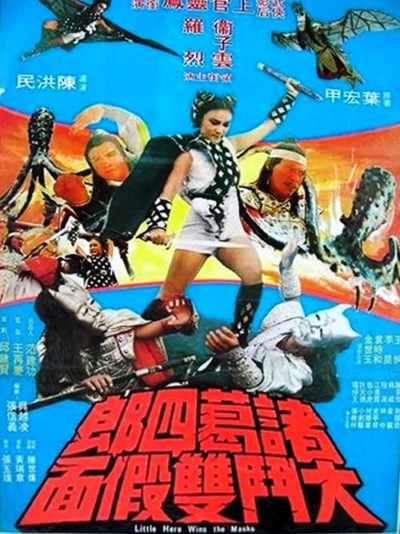 Although almost a decade earlier than Lin Hsiao Lan’s slew of fantasy kung-fu flicks, this shares a lot of the same elements – not least an approach to narrative coherence best described as “informal.” This starts at the beginning, where we don’t even get introduced to the participants, before the martial arts breaks out. As we learn a little later, it turns out this pits Chu-Kwok Su-Lan (Shang-Kuan) against three members of the Devil’s Gang, in defense of her two, largely useless sidekicks. This is just the first of numerous encounters between our hero – yes, it’s
Although almost a decade earlier than Lin Hsiao Lan’s slew of fantasy kung-fu flicks, this shares a lot of the same elements – not least an approach to narrative coherence best described as “informal.” This starts at the beginning, where we don’t even get introduced to the participants, before the martial arts breaks out. As we learn a little later, it turns out this pits Chu-Kwok Su-Lan (Shang-Kuan) against three members of the Devil’s Gang, in defense of her two, largely useless sidekicks. This is just the first of numerous encounters between our hero – yes, it’s 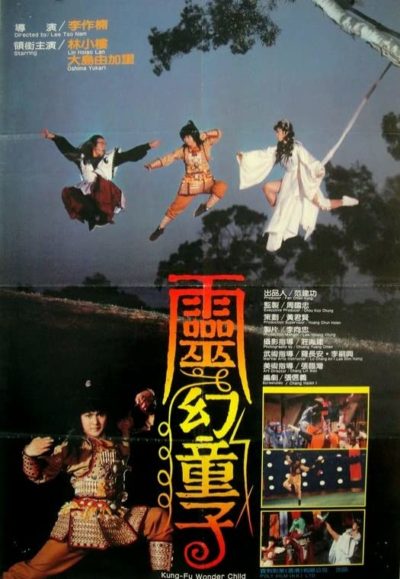 You may have noticed that I’ve been on a bit of a spree with these Taiwanese fantasy-fu flicks of late. However, I think I’m feeling a bit sated with them at this point, and the law of diminishing returns seems to be setting in. There are only so many unconvincing male impersonators, bad effects (both optical and practical) and almost illegible and/or illiterate subtitles a man can take, and I think I’ve reached my capacity in almost of these categories. Fortunately, my queue of such things seems to be nearing an end, with just a couple more to go. Still, after this delirious experience, I feel in need of a week or two’s break from the madness.
You may have noticed that I’ve been on a bit of a spree with these Taiwanese fantasy-fu flicks of late. However, I think I’m feeling a bit sated with them at this point, and the law of diminishing returns seems to be setting in. There are only so many unconvincing male impersonators, bad effects (both optical and practical) and almost illegible and/or illiterate subtitles a man can take, and I think I’ve reached my capacity in almost of these categories. Fortunately, my queue of such things seems to be nearing an end, with just a couple more to go. Still, after this delirious experience, I feel in need of a week or two’s break from the madness.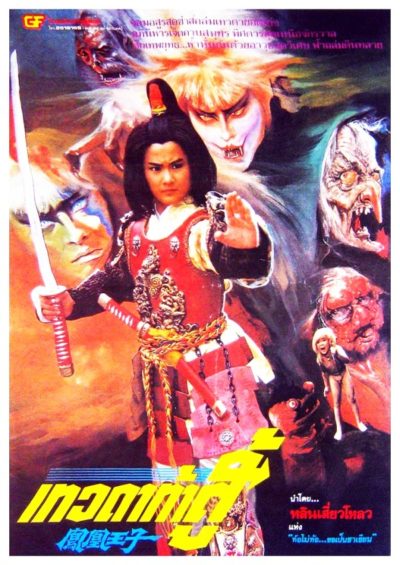 I am going to be entirely upfront, and state that any factual statements regarding the plot here will be entirely cribbed from other sources. Because, on my own, I have close to no clue as to the details of what was going. I got that some girl dressed as a guy, Little Flying Dragon (Lin, inevitably) was trying to protect Golden Boy (Chan) from a bunch of very strangely dressed weirdos with even more bizarre powers. They want Golden Boy for some nefarious purpose on behalf of an evil sorcerer type, who laughs maniacally. A lot. Everyone involved wears wigs which look like they were bought in bulk from Hair Metal R Us. There’s an acid pit, into which Golden Boy’s father is unceremoniously dropped. His mother is called “Evil Lady” in the subtitles, though she isn’t really. At one point, there’s a song whose lyrics according to the subs go, “Little Flying Dragon, Little Flying Dragon, change all the time, power breads everything.”
I am going to be entirely upfront, and state that any factual statements regarding the plot here will be entirely cribbed from other sources. Because, on my own, I have close to no clue as to the details of what was going. I got that some girl dressed as a guy, Little Flying Dragon (Lin, inevitably) was trying to protect Golden Boy (Chan) from a bunch of very strangely dressed weirdos with even more bizarre powers. They want Golden Boy for some nefarious purpose on behalf of an evil sorcerer type, who laughs maniacally. A lot. Everyone involved wears wigs which look like they were bought in bulk from Hair Metal R Us. There’s an acid pit, into which Golden Boy’s father is unceremoniously dropped. His mother is called “Evil Lady” in the subtitles, though she isn’t really. At one point, there’s a song whose lyrics according to the subs go, “Little Flying Dragon, Little Flying Dragon, change all the time, power breads everything.”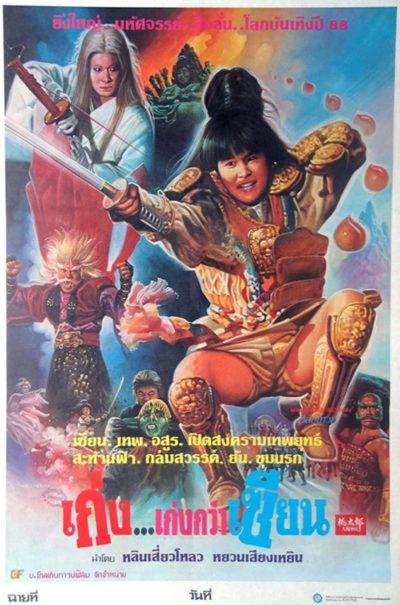 The best way to describe this, is perhaps to say that if I was nine years old, I would think it was the greatest movie I had ever seen. And I would likely be right, at the time. With the benefit of [redacted] more years, and several thousand additional movies under my belt… Not so much. Oh, it’s excessive, insanely imaginative and high energy, to be sure. However, it is also slapdash, incoherent and juvenile. Never mind appealing to nine-year-olds, it often feels like it was made by nine-year-olds. This explanation could be the most logical way to explain how the film manages to misspell its own name in the opening credits, calling itself Magic of Stell.
The best way to describe this, is perhaps to say that if I was nine years old, I would think it was the greatest movie I had ever seen. And I would likely be right, at the time. With the benefit of [redacted] more years, and several thousand additional movies under my belt… Not so much. Oh, it’s excessive, insanely imaginative and high energy, to be sure. However, it is also slapdash, incoherent and juvenile. Never mind appealing to nine-year-olds, it often feels like it was made by nine-year-olds. This explanation could be the most logical way to explain how the film manages to misspell its own name in the opening credits, calling itself Magic of Stell. For the first hour, you may be forgiven for wondering if there has been some kind of mistake, because the poster bears almost no resemblance to what happens in the film. Oh, it’s the same actress, to be sure, and she is a schoolgirl. But it appears, rather than the war story promised, you have strayed into a teenage drama. In it, Ai (Seino) is a talented but troubled student, who seems to be suffering from some kind of post-traumatic stress disorder. The special treatment she receives at school brings her enmity as a result, both from her class-mates and the er homeroom teacher (Kaneko). Though she finds solace in art, including a mysterious major project on which she is working, housed in the school auditorium.
For the first hour, you may be forgiven for wondering if there has been some kind of mistake, because the poster bears almost no resemblance to what happens in the film. Oh, it’s the same actress, to be sure, and she is a schoolgirl. But it appears, rather than the war story promised, you have strayed into a teenage drama. In it, Ai (Seino) is a talented but troubled student, who seems to be suffering from some kind of post-traumatic stress disorder. The special treatment she receives at school brings her enmity as a result, both from her class-mates and the er homeroom teacher (Kaneko). Though she finds solace in art, including a mysterious major project on which she is working, housed in the school auditorium. Liane Zane’s Elioud Legacy trilogy, all three books of which I’ve previously reviewed, is supernatural fiction, written by a Roman Catholic author, and premised on the fictional conceit that matings between angelic beings (both fallen and unfallen) and humans have been going on since before the Flood, producing mixed-race offspring who are physically human but have certain heightened physical or even latent supernatural abilities. That trilogy focused on three strong and courageous young women, who when it opened were completely unaware of their angelic genes, and all of whom were both serving in the intelligence services of their various countries, and collaborating with each other on the side in a covert alliance to provide some special protection for the victims of sexual assault and trafficking. The Covert Guardian is the first volume of a projected prequel trilogy, set a few years before the opening of the previously-published one, which will tell the “origin story” of their friendship and alliance. Here, our protagonist is Olivia Markham, the trio’s unofficial ringleader, and we learn how, as a 20-year-old college pre-med student, she unexpectedly came to join the CIA.
Liane Zane’s Elioud Legacy trilogy, all three books of which I’ve previously reviewed, is supernatural fiction, written by a Roman Catholic author, and premised on the fictional conceit that matings between angelic beings (both fallen and unfallen) and humans have been going on since before the Flood, producing mixed-race offspring who are physically human but have certain heightened physical or even latent supernatural abilities. That trilogy focused on three strong and courageous young women, who when it opened were completely unaware of their angelic genes, and all of whom were both serving in the intelligence services of their various countries, and collaborating with each other on the side in a covert alliance to provide some special protection for the victims of sexual assault and trafficking. The Covert Guardian is the first volume of a projected prequel trilogy, set a few years before the opening of the previously-published one, which will tell the “origin story” of their friendship and alliance. Here, our protagonist is Olivia Markham, the trio’s unofficial ringleader, and we learn how, as a 20-year-old college pre-med student, she unexpectedly came to join the CIA.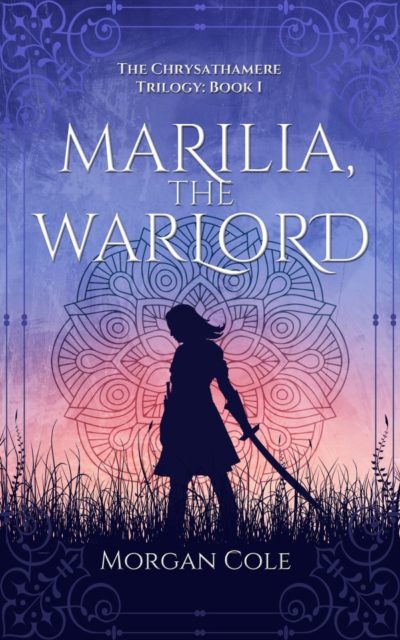 This is a fairly classic “rise from nowhere” story, yet is well-executed and done in a world which is interesting for its differences. The heroine is – surprise! – Marilia, whom we first meet on the battlefield, about to face an opponent of superior numbers. We then flash back to her childhood, growing up in a Tyracian brothel. Her mother was one of the “painted ladies,” but after she dies, Marilia and her brother Annuweth are on increasingly thin ice. Their effort to run away is unsuccessful, yet does bring them a chance at a new life. While it’s here that Marilia discovers her tactical savvy through board games, it’s not without its downside, the siblings being split up after Marilia enters an arranged marriage in another territory.
This is a fairly classic “rise from nowhere” story, yet is well-executed and done in a world which is interesting for its differences. The heroine is – surprise! – Marilia, whom we first meet on the battlefield, about to face an opponent of superior numbers. We then flash back to her childhood, growing up in a Tyracian brothel. Her mother was one of the “painted ladies,” but after she dies, Marilia and her brother Annuweth are on increasingly thin ice. Their effort to run away is unsuccessful, yet does bring them a chance at a new life. While it’s here that Marilia discovers her tactical savvy through board games, it’s not without its downside, the siblings being split up after Marilia enters an arranged marriage in another territory.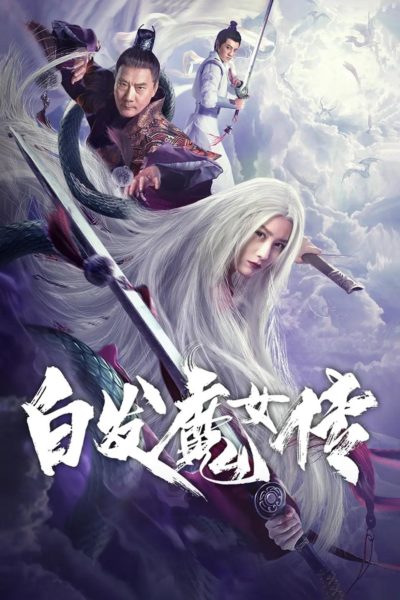
 I’ve been on a bit of a kick of
I’ve been on a bit of a kick of 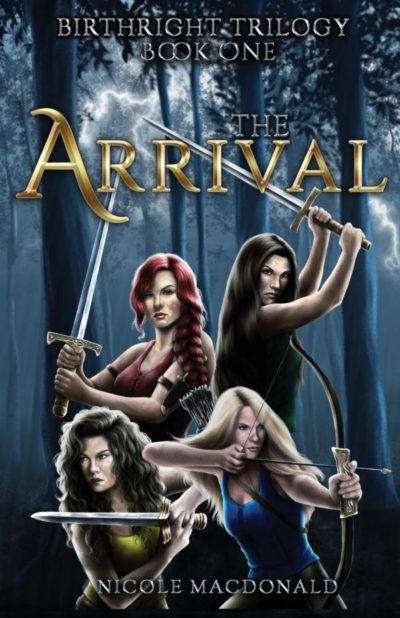 I’ve made a terrible mistake. I don’t recall exactly at what point in reading this, I first came to that conclusion. It may have been the multi-page description of dress fitting. It could have been the lengthy shopping expedition. But it’s safe to say that, if I hadn’t been running behind on book reviews, this would almost certainly have been a Did Not Finish, and consigned to the recycle bin of oblivion. The main problem, if definitely not the only one, is the mismatch between the description and reality. The Amazon page describes it, rather breathlessly, as “An Epic Fantasy Romance Adventure.” Silly me, I expected this to mean about equal amounts of those elements, especially given the cover. A more accurate description would be, “A Romantic Epic Romance Fantasy ROMANCE Romance Adventure ROMANCE, with added
I’ve made a terrible mistake. I don’t recall exactly at what point in reading this, I first came to that conclusion. It may have been the multi-page description of dress fitting. It could have been the lengthy shopping expedition. But it’s safe to say that, if I hadn’t been running behind on book reviews, this would almost certainly have been a Did Not Finish, and consigned to the recycle bin of oblivion. The main problem, if definitely not the only one, is the mismatch between the description and reality. The Amazon page describes it, rather breathlessly, as “An Epic Fantasy Romance Adventure.” Silly me, I expected this to mean about equal amounts of those elements, especially given the cover. A more accurate description would be, “A Romantic Epic Romance Fantasy ROMANCE Romance Adventure ROMANCE, with added